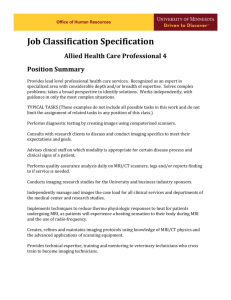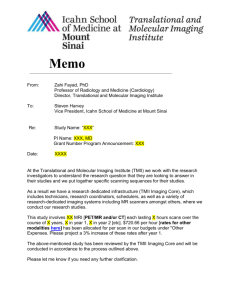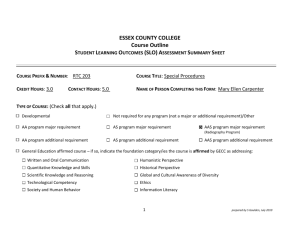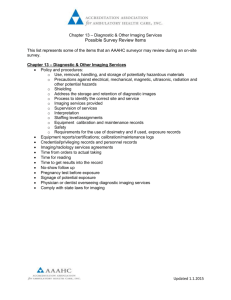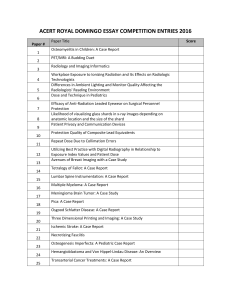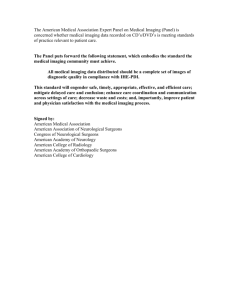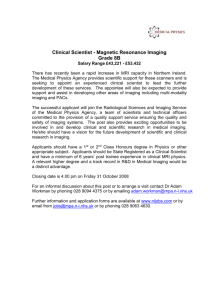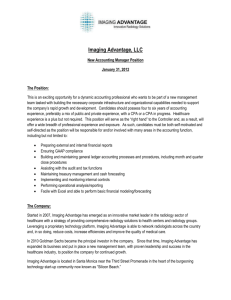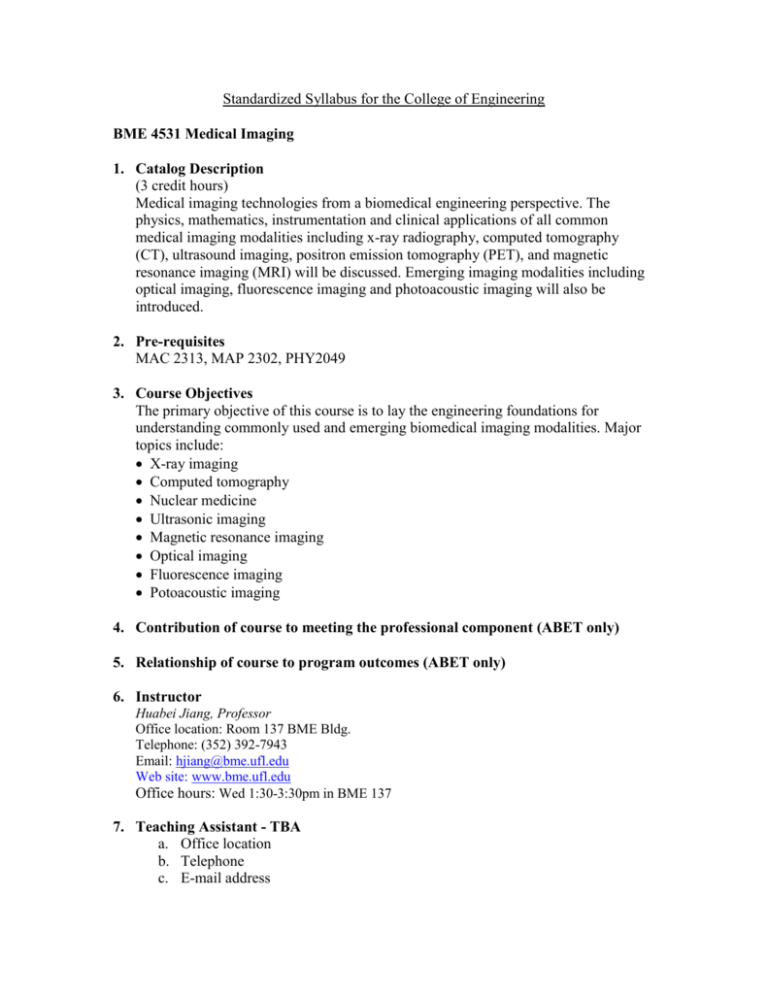
Standardized Syllabus for the College of Engineering
BME 4531 Medical Imaging
1. Catalog Description
(3 credit hours)
Medical imaging technologies from a biomedical engineering perspective. The
physics, mathematics, instrumentation and clinical applications of all common
medical imaging modalities including x-ray radiography, computed tomography
(CT), ultrasound imaging, positron emission tomography (PET), and magnetic
resonance imaging (MRI) will be discussed. Emerging imaging modalities including
optical imaging, fluorescence imaging and photoacoustic imaging will also be
introduced.
2. Pre-requisites
MAC 2313, MAP 2302, PHY2049
3. Course Objectives
The primary objective of this course is to lay the engineering foundations for
understanding commonly used and emerging biomedical imaging modalities. Major
topics include:
X-ray imaging
Computed tomography
Nuclear medicine
Ultrasonic imaging
Magnetic resonance imaging
Optical imaging
Fluorescence imaging
Potoacoustic imaging
4. Contribution of course to meeting the professional component (ABET only)
5. Relationship of course to program outcomes (ABET only)
6. Instructor
Huabei Jiang, Professor
Office location: Room 137 BME Bldg.
Telephone: (352) 392-7943
Email: hjiang@bme.ufl.edu
Web site: www.bme.ufl.edu
Office hours: Wed 1:30-3:30pm in BME 137
7. Teaching Assistant - TBA
a. Office location
b. Telephone
c. E-mail address
d. Office hours
8. Meeting Times
Course meets 3 times per week, schedule TBA
9. Class/laboratory schedule
Course meets 3 50 minute periods per week
10. Meeting Location
TBA
11. Material and Supply Fees
None
12. Textbooks and Software Required
Introduction to Biomedical Imaging
Andrew Webb
John Wiley & sons, Inc. publishers.
2003, First edition.
ISBN: 0-471-23766-3
13. Recommended Reading
(1) Jerry L. Prince, Jonathan M. Links, “Medical Imaging Signals and Systems ”,
Pearson Prentice Hall, 2005(First edition);
(2) Jerrold T. Bushberg, et al., “The essential physics of medical imaging”, Lippincott
Williams & Wilkins, 2002 (Second edition).
14. Course Outline
Lecture Topic
Week 1 Introduction to Biomedical Imaging
Week 1 History and development of Biomedical Imaging
X-rays: Physics and instrumentation
Week 1
X-ray tubes, detectors, X-ray attenuation in tissue
Week 2 X-rays: Film, image intensifiers, detectors
Week 2 Computed Tomography: Principles
Week 3 Computed Tomography: Reconstruction algorithms
Week 3 Computed Tomography: Instruments and clinical applications
Week 4 X-ray and CT quiz
Week 5
Week 5
Week 6
Week 6
Week 7
Introduction to Nuclear medicine
SPECT: physical foundation
SPECT: Image reconstruction and instrumentation
PET: physical foundation
PET: image reconstruction and instrumentation
Week 7
Week 8
Week 8
Week 9
Week 9
Week 10
Introduction to ultrasound imaging
2D ultrasound imaging(A-Mode, M-Mode, B-mode)
3D/4D ultrasound imaging
Doppler imaging: physical foundation
Doppler imaging: instrumentation and clinical applications
Ultrasound contrast agent and Nonlinear imaging
Week 10 Midterm Exam
Week 11
Week 11
Week 12
Week 12
Week 13
MRI: Physical foundations
MRI: Image reconstruction
MRI: Instrumentation
MRI: Clinical Applications
MRI quiz
Week 13 Review, questions and discussion
Week 14 Presentations
Week 14 Introduction to Diffuse optical imaging (DOT)
Week 15 Introduction to Fluorescence Tomography (FT)
Week 15 Introduction to Photoacoustic tomography (PAT)
TBD
FINALS
15. Attendance and Expectations
Class participation is required and part of the final grade
16. Grading
25% Homework
25% Midterm Exam
25% Projects
25% Final Exam
17. Grading Scale
A
AB+
B
B-
C+
C
C-
D+
D
D-
E
> 90
80-83
77-79
74-76
70-73
67-69
64-66
60-63
57-59
< 56
87-89
84-86
18. Make-up Exam Policy
Midterm and Final Exam can be made up in extreme circumstances and if the
instructor is notified before the start of the exam.
19. Honesty Policy
All students admitted to the University of Florida have signed a statement of
academic honesty committing themselves to be honest in all academic work and
understanding that failure to comply with this commitment will result in disciplinary
action. This statement is a reminder to uphold your obligation as a UF student and to
be honest in all work submitted and exams taken in this course and all others.
20. Accommodation for Students with Disabilities
Students Requesting classroom accommodation must first register with the Dean of
Students Office. That office will provide the student with documentation that he/she
must provide to the course instructor when requesting accommodation.
21. UF Counseling Services
Resources are available on-campus for students having personal problems or lacking
clear career and academic goals. The resources include:
- University Counseling Center, 301 Peabody Hall, 392-1575, Personal and
Career Counseling.
- SHCC mental Health, Student Health Care Center, 392-1171, Personal and
Counseling.
- Center for Sexual Assault/Abuse Recovery and Education (CARE), Student
Health Care Center, 392-1161, sexual assault counseling.
- Career Resource Center, Reitz Union, 392-1601, career development assistance
and counseling.
22. Software Use
All faculty, staff and student of the University are required and expected to obey the
laws and legal agreements governing software use. Failure to do so can lead to
monetary damages and/or criminal penalties for the individual violator. Because such
violations are also against University policies and rules, disciplinary action will be
taken as appropriate. We, the members of the University of Florida community,
pledge to uphold ourselves and our peers to the highest standards of honesty and
integrity.

